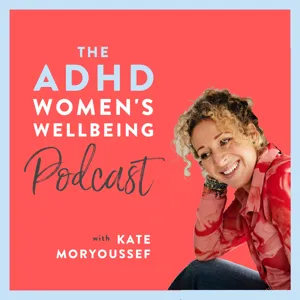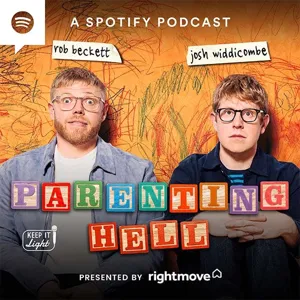Podcast Summary
Supporting Women with ADHD in Parenting: The 'Hyper Healing' book, authored by Abigail Kimpel, offers valuable insights and practical advice for women with ADHD in raising children with ADHD symptoms, with a focus on managing technology and finding balance.
The ADHD Women's Well-being Podcast, hosted by Kate Moore, aims to support women with ADHD in improving their well-being and making intentional lifestyle choices. In this episode, Kate welcomed Abigail Kimpel, a special education teacher, college lecturer, private practice therapist for ADHD, and author of the book "Hyper Healing: The Empowered Parent's Complete Guide to Raising a Healthy Child with ADHD Symptoms." Abigail wrote the book as a resource she wished she had as a young parent, as she made many mistakes due to lack of guidance. The book covers various aspects of parenting a child with ADHD, and it's also beneficial for parents with ADHD. The podcast episode focuses on the relevance of the book for women with ADHD, as they are often the first generation to parent diagnosed children, and both parents need increased awareness. The book provides up-to-date information and advice, including managing technology, to help families find balance and calm.
Understanding the 'failure to launch' in women with ADHD: Identify and address the root causes of 'failure to launch' in women with ADHD, such as fear and self-doubt, to move forward.
While the increased awareness and diagnosis of ADHD in children and adults can bring benefits such as self-compassion and understanding, it can also lead to lower expectations and a potential sense of being stuck. This notion of "failure to launch," or the inability to get started on new projects or goals, can manifest in women with busy families who feel overwhelmed and incapable due to their ADHD symptoms. Instead of assuming one is a failure, it's essential to identify the specific reasons that are preventing progress. In the case of a woman wanting to pursue horseback riding therapy, her fear of intimidation and self-doubt were the root causes. By recognizing and addressing these underlying issues, one can unstick themselves and move forward. It's crucial to remember that the stories we tell ourselves about our abilities and limitations are not always true, and with self-love and patience, we can overcome the obstacles that hold us back.
Impact of negative childhood comments on self-belief: Parents and caregivers should avoid reinforcing limitations and instead encourage growth mindset to help children with learning differences build confidence and succeed in adulthood.
Negative comments and expectations from childhood, often rooted in a lack of understanding about neurodivergence and learning differences, can significantly impact an individual's self-belief and ability to succeed in adulthood. Parents and caregivers play a crucial role in shaping children's beliefs about their abilities, and it's essential to avoid pigeonholing them into rigid roles. Even though it may seem loving and understanding, constantly reinforcing limitations can be damaging. By recognizing and addressing these patterns, parents can help their children build confidence and develop a growth mindset. Additionally, individuals with ADHD face unique challenges due to neurological differences, but with acknowledgement, self-awareness, and the understanding that belief systems can be changed, they can overcome these obstacles and thrive.
Understanding ADHD vs Building Healthy Habits: While ADHD can provide insight into challenges, focusing on healthy habits can lead to significant improvements in life.
While ADHD is a real condition with identified symptoms, it's important to remember that it's not a definitive explanation for every challenge we face. Instead, focusing on building healthy habits can be just as impactful as understanding the neuroscience behind ADHD. The instant gratification personality often associated with ADHD can make forming habits difficult, but it also brings unique strengths like curiosity and flexibility. The neuroscience of ADHD is not as clear-cut as we once believed, and relying too heavily on a diagnosis can be an excuse for not taking action. By focusing on creating healthy habits, we can strengthen our brains and improve our lives, even if it's a slower process than we might hope. Ultimately, it's a balancing act between understanding our challenges and believing in our ability to overcome them.
No definitive brain scan for ADHD diagnosis: The diagnosis of ADHD is complex and ongoing, with research focusing on progress and personalized approaches rather than relying solely on brain scans or scientific proof.
While there have been numerous studies on the neurological differences in individuals diagnosed with ADHD, a definitive brain scan for diagnosis does not exist. ADHD is believed to have a strong genetic component, but environmental factors and trauma can also play a role. The author of a 2017 study, which aimed to identify neurological differences in children with ADHD, acknowledged that the study did not provide enough evidence to diagnose ADHD based on brain scans alone. The focus should be on progress and figuring out what works best for individuals with ADHD, rather than relying solely on scientific proof or brain scans. Despite ongoing research, the diagnosis and understanding of ADHD continue to evolve, highlighting the importance of personalized approaches and continued exploration.
Environmental factors impact ADHD symptoms: Trauma, neglect, socioeconomic status, and parenting styles can contribute to ADHD symptoms. A supportive environment is crucial for children with ADHD.
Environmental factors, including war zones, excessive screen time, and lack of sleep, can contribute to ADHD symptoms. These symptoms are not a misdiagnosis but a list of behaviors that need addressing. Trauma, such as neglect or abandonment, can also impact brain development and potentially lead to ADHD. The intergenerational transmission of trauma through epigenetics is also a factor. Parenting styles and socioeconomic status can significantly impact a child's development, especially for those with ADHD. Success stories come from strong-willed individuals who manage to overcome their conditioning and upbringing. Therefore, it is crucial to recognize the importance of a nurturing environment for children with ADHD.
Empowering Individuals with ADHD: Taking care of oneself, acknowledging challenges as opportunities, creating a supportive environment, and using positive messaging can help individuals with ADHD thrive.
The environment and self-empowerment play crucial roles in managing ADHD symptoms. The speaker emphasizes the importance of taking care of oneself and acknowledges that individuals with ADHD may not need to be superhuman to cope. Instead, it's essential to frame challenges as opportunities for growth and empower the person to overcome them. A supportive environment that emphasizes strengths and encourages perseverance can help individuals with ADHD thrive. The power of positive messaging, such as compliments, can also significantly impact brain development and self-confidence. The speaker's personal experiences and anecdotes highlight the importance of empowering individuals with ADHD to believe in their abilities and learn from their challenges.
Our brains focus more on negativity: Recognize the value of compliments, focus on accomplishments, and break the cycle of generational criticism to overcome negativity bias and propel forward.
Our brains are wired to focus more on negative comments than positive ones, a trait that may have evolved from our ancient past when survival depended on being able to quickly identify and respond to threats. This negativity bias can be detrimental if we let it define our self-perception, keeping us stuck in a cycle of self-criticism rather than allowing us to learn and grow. Instead, we should strive to acknowledge and appreciate the compliments and positive feedback we receive, using it as fuel for self-improvement rather than dismissing it. Additionally, breaking the cycle of generational criticism requires conscious effort and a shift in perspective. By recognizing the value of compliments and focusing on our accomplishments, we can overcome the negative biases that hold us back and propel ourselves forward.
Focusing on positivity in parenting: Modeling positive behavior, expressing pride daily, and focusing on compliments can improve relationships, boost self-confidence, and create a more positive family environment for children with ADHD.
Focusing on compliments and positive reinforcement, rather than criticism, is essential for effective parenting, especially for parents of children with ADHD. Criticizing can trigger negative emotions and behavior, while positive reinforcement can encourage good habits and emotional growth. It's important to model this behavior for children and make a deliberate effort to focus on the positive, even during challenging times. This requires conscious effort as it goes against our natural tendencies, but the rewards are significant. Parents should aim to set aside time each day to reflect on what they are proud of and express it out loud, both to themselves and their children. This shift in focus can lead to improved relationships, increased self-confidence, and a more positive family environment.
Recognizing our worth beyond serving others: Invest in relationships that give us energy and care for our inner voice to prioritize self-worth, even if it's challenging. Seek help from professionals like Abigail at hybridhealing.org.
It's essential for individuals, particularly women, to prioritize their inner voice and recognize their worth beyond serving others. This can be a challenging process, especially for those with a background of neglect or abuse. It's important to acknowledge that spending time with people who drain energy and do not make us feel loved and cared for is not serving ourselves or others. Instead, we should focus on building relationships with those who give us energy and share beautiful connections. This inner work is not easy, but the rewards are significant. It's essential to acknowledge that this process may not be easy if we haven't seen it modeled in our families. However, it's crucial to remember that this work is worth the effort, and it's never too late to progress and find our patterns to change them. Abigail, the speaker, offers her services through her website, hybridhealing.org, and works with parents and adults to help them uncover the layers causing pain and move forward in a healthier way. Her next book is coming soon, and she aims to reach out to more families in the future.
Helping Parents Navigate the Challenges of Raising a Child with ADHD: Parents of children with ADHD can access effective treatment options by being informed about alternatives and advocating with healthcare providers. Abigail Marsh's book provides valuable insights and practical strategies.
Abigail Marsh, the author of "The Genius of Mindless Thinking," identified a gap in the healthcare system for affordable, high-quality treatment plans for children diagnosed with ADHD. Frustrated by the limited resources and information available to parents, she wrote a book compiling her entire plan to help parents navigate the challenges of raising a child with ADHD. Marsh emphasized the importance of being informed about alternative treatments and advocating for them with healthcare providers. She believes every parent, regardless of financial means, deserves access to effective treatment options. Listeners can purchase her book through the show notes for valuable insights and practical strategies. Remember, knowledge and awareness are powerful tools, especially when it comes to ADHD. Join the community on the ADHD Women's Well-being Pod Instagram page and consider leaving a review to spread the word.






